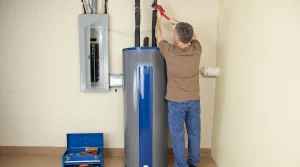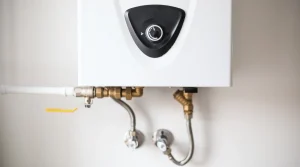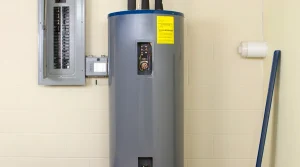A shower should be a sanctuary of relaxation, but unpleasant odors can quickly disrupt this haven. Identifying the cause of a smelly shower is essential to restoring your bathroom’s comfort and cleanliness. Let’s explore the common causes and solutions for this issue.
Key Takeaway
- A smelly shower can turn a relaxing ritual into an unpleasant experience. Common culprits include a dry or dirty P-trap, pipe leaks, biofilm buildup, and clogged drains.
- Identifying and addressing the source of the odor ensures a fresh and clean shower space.
- Regular maintenance and professional assistance can help keep these problems at bay.
How to Determine the Source of the Odor
The first step to resolving a smelly shower is identifying the source of the odor. Pay attention to the type of smell—whether it’s musty, sewage-like, or reminiscent of rotten eggs. This can provide valuable clues about the underlying problem.
1. A Dry or Soiled P-Trap
If your shower drain smells like sewage, a dry or dirty P-trap might be to blame. The P-trap is a U-shaped pipe beneath the drain that holds water to block sewer gases from entering your bathroom. When this water evaporates or the trap gets clogged, odors can escape.
How to Check Your P-Trap:
- Shine a flashlight into the drain to check for water in the P-trap.
- If it appears dry or clogged, it needs attention.
Cleaning Your P-Trap:
- Remove debris with a paper towel or old rag.
- Fill the trap with water to restore the seal.
- Use a mild disinfectant or enzyme-based cleaner to remove any lingering bacteria.
2. Pipe Leaks
A sulfuric or rotten egg smell often indicates a pipe leak. This could be caused by corroded pipes, loose connections, or faulty valves that allow sewer gases to seep out.
Identifying Leaky Pipes:
- Look for water stains or damp areas under your bathroom.
- Check pipe joints and connections for visible damage or corrosion.
Fixing Leaks:
- Tighten loose connections and replace corroded sections.
- If the issue persists, consult a professional plumber for a thorough inspection and repair.
3. Biofilm Buildup
Biofilm is a sticky layer of bacteria, soap scum, and organic matter that can accumulate in your drain pipes. This buildup not only clogs drains but also emits a foul odor.
Removing Biofilm:
- Use an enzyme-based cleaner to dissolve biofilm.
- Scrub the drain with a brush to remove stubborn buildup.
- Regularly clean the drain to prevent future biofilm formation.
4. Drain Blockages
Hair, soap scum, and other debris can accumulate in your drain, causing blockages that emit unpleasant smells. Standing water in clogged drains accelerates the decomposition of organic matter, worsening the odor.
How to Unclog a Drain:
- Remove the drain cover and manually clear out visible debris.
- Use a plunger or plumbing snake to dislodge deeper blockages.
- Flush the drain with hot water and vinegar for a natural cleaning solution.
Preventative Measures
Keeping your shower odor-free requires regular maintenance. Here are some simple steps to prevent odors:
- Run water through unused drains: Prevent P-traps from drying out by periodically running water through them.
- Clean drains regularly: Remove hair and debris to prevent blockages.
- Use enzyme-based cleaners: These solutions effectively dissolve organic matter without harming your plumbing.
- Inspect for leaks: Check pipes and connections for signs of wear and tear.
- Install drain covers: These prevent large debris from entering your pipes.
FAQ
Q: Why does my shower smell like sewage?
A sewage-like odor typically points to a dry or dirty P-trap, which allows sewer gases to escape into your bathroom. Refill the P-trap with water and clean it thoroughly to resolve the issue.
Q: What causes a rotten egg smell in the shower?
A rotten egg smell is often caused by sulfurous gases from leaking pipes or bacteria in the drain. Check for leaks and clean the drain with an enzyme-based cleaner.
Q: How can I prevent biofilm buildup in my shower drain?
Regularly clean your drain with enzyme-based solutions and remove hair or debris that may accumulate. Avoid pouring greasy substances down the drain, as these contribute to biofilm formation.
Q: When should I call a plumber for a smelly shower?
If you’ve tried DIY solutions and the odor persists, it’s time to call a plumber. Persistent smells may indicate underlying issues like pipe leaks or extensive blockages that require professional intervention.
Q: Are chemical drain cleaners safe to use?
Chemical drain cleaners can be harsh and damage your plumbing over time. Opt for enzyme-based or natural solutions to clean your drains safely and effectively.
Q: Can smelly shower drains affect my health?
Yes, prolonged exposure to sewer gases can lead to health issues such as headaches, nausea, or respiratory problems. It’s essential to address the source of the odor promptly.
Need Professional Help?
If you’ve tried everything and your shower still smells, it’s time to call the experts. BJC Clifton Plumbers can help you restore your bathroom to its fresh and relaxing state. Contact us at (973) 858 5005 for professional plumbing solutions tailored to your needs.




